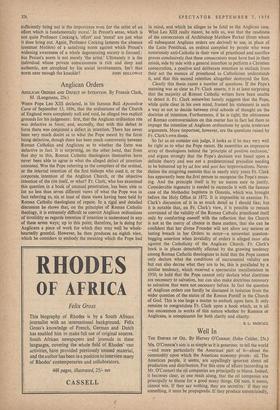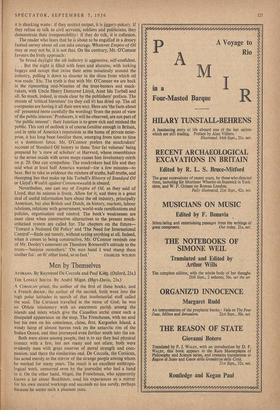Well In
THE EMPIRE OF OIL. By Harvey O'Connor. (John Calder, 25s.)
MR. O'CONNOR'S aim is as simple as it is generous; to tell the world —and more particularly the American part of it—about the commodity upon which the American economy pivots: oil. The American people, it seems, are appallingly ignorant about oil production and distribution. For this state of affairs (according to Mr. O'Connor) the oil companies are principally to blame. Indeed, it becomes clear, as one reads along, that the oil companies are principally to blame for a good many things. Oil men, it seems, cannot win. If they say nothing, they are secretive: if they say something, it must be propaganda. If they produce unrestrictedly, The reader who fears that he is about to be engulfed in a dreary factual survey about oil can take courage. Whatever Empire of Oil may or may not be, it is not that. On the contrary, Mr. O'Connor favours the lively approach : 'In broad daylight the oil industry is aggressive, self-confident.
. . But the night is filled with fears and alarums, with lurking bogeys and octopi that twine their arms noiselessly around the industry, pulling it down to disaster in the slime from which oil was made.' Etc. The truth is that with Mr. O'Connor we are back in the ripsnorting mid-Nineties of the trust-busters and muck- rakers, with Uncle Henry Demarest Lloyd, Aunt Ida Tarbell and all. So much, indeed, is made clear by the publishers' preface. The stream of 'critical literature' (as they call it) has dried up. The oil companies are having it all their own way. Here are 'the facts about oil' presented (note carefully the wording) 'from the point of view of the public interest.' Producers, it will be observed, are not part of 'the public interest': their function is to grow rich and mislead the public. This sort of outlook is of course familiar enough in Britain, and in spite of America's reputation as the home of private enter- prise, it has long been familiar there, emerging from time to time as a dominant force. Mr. O'Connor prefers the muckrakers' account of Standard Oil history to those 'four fat volumes' being prepared by 'a crew of scholars' at Harvard, whose resemblance to the seven maids with seven mops causes him involuntary mirth on p. 20. One can sympathise. The muckrakers had life and they said what at least half America wanted—for a few minutes—to hear. But to take as evidence the mixture of truths, half-truths, and thumping lies that make up Ida Tarbell's History of Standard Oil or Lloyd's Wealth against Commonwealth is absurd.
Nevertheless, one can say of Empire of Oil, as they said of Lloyd, that its animus is frank. Allow for it, and there is a great deal of useful information here about the oil industry, principally American, but also British and Dutch, its history, markets, labour relations, relations with government, world-wide ramifications and policies, organisation and control. The book's weaknesses are most clear when constructive alternatives to the present much- criticised system are called for. The chapters on the future— 'Toward a National Oil Policy' and 'The Need for International Control'—fizzle out tamely, without saying anything at all. Indeed, when it comes to being constructive, Mr. O'Connor reminds one of Mr. Dooley's comment on Theodore Roosevelt's attitude to the trusts—'heejous monsthers."On wan hand I wud stamp them undher fut.: on th' other hand, so so fast.' CHARLES WILSON



































 Previous page
Previous page